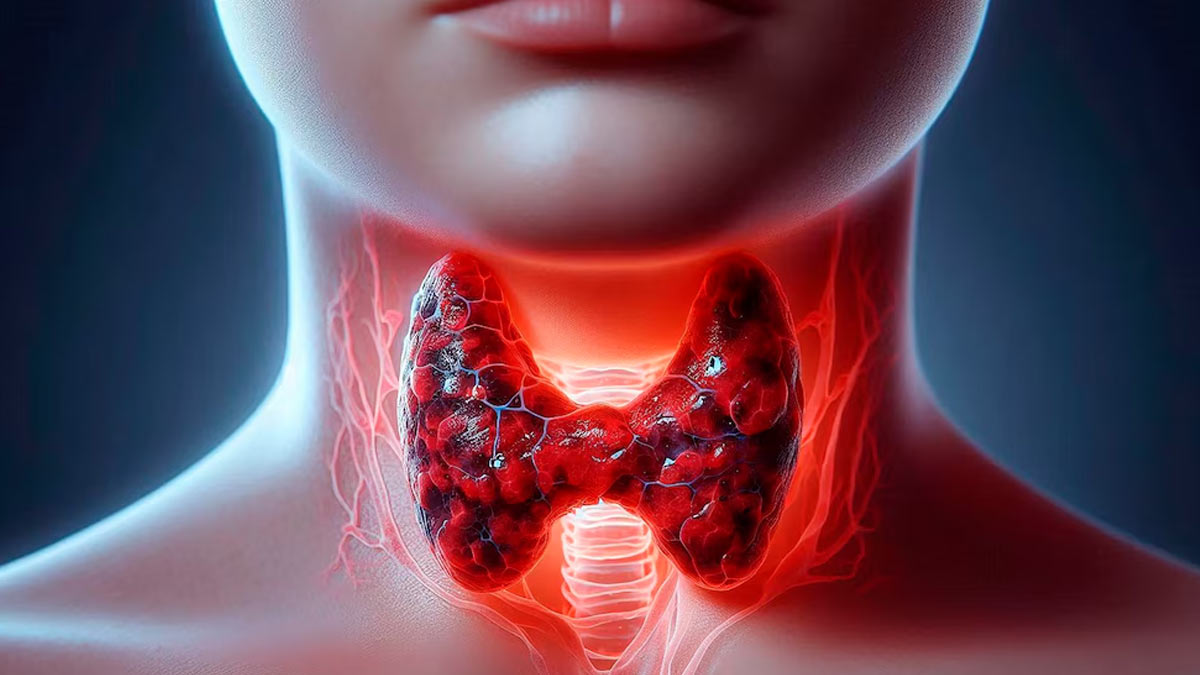Thyroid cancer may not be the most talked-about cancer, but its prevalence is on the rise. While cancers like lung, breast, cervical, or ovarian cancer often take the spotlight, thyroid cancer can have equally significant health impacts. The thyroid gland, located at the base of the neck, is where this cancer develops, affecting the body’s metabolism, heart rate, and other essential functions.
Let’s understand different types, symptoms, and risk factors associated with thyroid cancer, with insights from Dr Supriya Bambarkar, Director of Oncology and Consultant Onco Surgeon at AIMS Hospital, Dombivli.
Types of Thyroid Cancer
Thyroid cancer can present itself in several forms, each with its own characteristics and impact on the body.
1. Papillary Thyroid Cancer:
“Papillary thyroid cancer is the most common type, making up more than 50% of cases. It’s known for its slow growth and ability to spread to lymph nodes in the neck. However, despite its tendency to spread, it often has a good prognosis when treated promptly,” explains Dr Bambarkar.
2. Follicular Thyroid Cancer:
According to research published by Columbia University, this form includes Hurthle cell cancer and is more likely to spread to organs like the lungs and bones. It’s less common but needs careful attention due to its invasive nature.
3. Medullary Thyroid Cancer:
“Medullary thyroid cancer is quite rare but may be linked to genetic conditions. It often requires prompt intervention due to its aggressive nature,” adds Dr Bambarkar.
4. Anaplastic Thyroid Cancer:
This is a very rare and aggressive form of thyroid cancer that spreads quickly, requiring immediate treatment.
Also read: Do Not Ignore These 5 Warning Signs Of Thyroid Cancer
Causes and Risk Factors
Thyroid cancer can develop for several reasons, and understanding the risk factors is essential for early detection. Dr Bambarkar explained, “Age is a significant factor, as thyroid cancer is more common in people over 40. A family history of thyroid cancer or other cancers like breast or testicular cancer also increases the risk. Conditions like an enlarged goitre, iodine deficiency, or thyroiditis (inflammation of the thyroid gland) can contribute to the development of cancer. Genetic conditions are another important cause, especially in medullary thyroid cancer.”
People with these risk factors should consider regular check-ups and screenings, especially if they experience any symptoms.
Symptoms of Thyroid Cancer

Thyroid cancer can sometimes be tricky to detect because its symptoms overlap with other conditions. However, if you experience any of the following, it’s crucial to consult a healthcare provider:
- Pain in the front of the neck
- A lump or swelling in the neck
- Difficulty breathing or swallowing
- Persistent coughing
- Fatigue and poor appetite
- Nausea, vomiting, or weight loss
“These symptoms should never be ignored,” warns Dr Bambarkar. “A thorough evaluation, including blood tests, biopsies, CT, or PET scans, is needed to confirm a diagnosis. Early detection plays a key role in successful treatment outcomes.”
Also read: 5 Common Symptoms Of Thyroid Problems In Early 30s
Diagnosis and Treatment
Once thyroid cancer is diagnosed, a treatment plan will be designed based on the stage and type of cancer. The primary treatment is surgery. Dr Bambarkar highlights the common surgical options:
“The most common surgery for thyroid cancer is a total thyroidectomy, where the entire thyroid gland is removed. In cases where the cancer is localised, a lobectomy, which removes the affected lobe of the thyroid, might be performed. In some instances, a near-total thyroidectomy removes most of the gland, leaving behind only a small portion.”
After surgery, further treatments are determined based on how far the cancer has spread. These may include:
- Radioactive iodine treatment to destroy any remaining thyroid tissue
- Radiation therapy and chemotherapy for more aggressive cases
- Targeted therapy for advanced stages of cancer

“Each patient’s journey with thyroid cancer is unique, and the treatment plan should be tailored to their specific needs,” adds Dr Bambarkar. “With advancements in treatment, even aggressive forms of thyroid cancer can be managed effectively, improving the patient’s quality of life.”
Thyroid cancer, when caught early, has a high rate of successful treatment. Dr Bambarkar emphasised the importance of awareness and said, “Many people may not think about their thyroid health, but early detection is crucial. Regular check-ups, especially for those with risk factors, can help identify cancer at an early stage when treatment is most effective.”
Conclusion
Thyroid cancer is not as widely discussed as other types of cancer, but understanding its symptoms, risk factors, and treatment options can help in catching it early and improving the outcome. If you or someone you know falls into a high-risk category or experiences the symptoms mentioned, it’s important to seek medical attention immediately. Stay informed, stay proactive, and prioritise your health.
